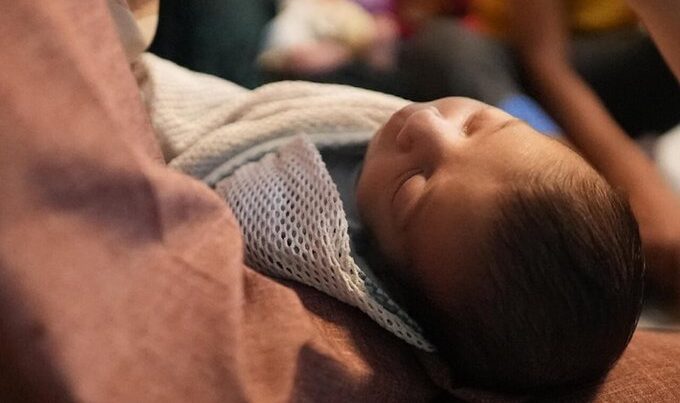
The plight of expectant mothers is a poignant subtext to the greater tragedy unfolding in the Gaza Strip.
Within the besieged enclave, the sanctuary of the womb has become a battleground where blooming life teeters on the brink, threatened by the stress of conflict, the specter of starvation and the potential murder of the infant’s mother.
“Numerous women have arrived at the hospital either dead or dying, too late to save, along with their babies,” Doctors Without Borders pediatrician Tanya Haj-Hassan told the New Arab. “For some, however, we could do post-mortem Cesarean sections,” sparing at least one of the lives.
According to The Lancet, an estimated 183 women give birth daily in Gaza, of whom 15% need medical care due to pregnancy or birth-related complications. Yet nearly 40% of hospitals are destroyed or only partially functioning and nearly two-thirds of primary health care clinics are shuttered.
As hospitals strain under the weight of overwhelming demand and dwindling resources, expectant mothers face a dire dilemma – deliver amidst the chaos at home or risk the perilous journey in search of medical aid. The once bustling corridors of medical facilities, brimming with anticipation, now bear witness to the silent agony of mothers who labor amidst the rubble, their cries muted by the deafening roar of conflict.
The toll of war extends beyond the physical realm, seeping into the very fabric of maternal health – women’s emotional wellbeing. Expectant mothers like Aya Ahmad must carry on despite not knowing whether their infant still lives in their womb, after the fetus suddenly goes quiet. And Asmaa Sendawi recently gave birth in the most precarious of conditions. How will the new baby thrive?
“I delivered my baby in the middle of the night,” remembers Asmaa. “It was too dangerous to walk in the street, and we tried many times to call for an ambulance. Finally, we managed to get a donkey cart. and it took an hour to get to the nearest hospital that was still functioning, at least a little. I barely made it.”
Women who experience complications during their delivery face grave dangers. Khadija Ahmed, 29, finally became pregnant after 10 years of exorbitant costs while she tried embryo transplantation. She longed for the day of birth and the moment she could embrace her infant. However, Khadija required a cesarean section and there was no anesthesia to be had. According to CNN, anesthesia is among the items most frequently rejected for importation into Gaza by Israel, along with crutches, ventilators, x-ray machines and oxygen cylinders.
“I could feel the knife tearing through the layers of my stomach and hear the sound of my flesh ripping. I can’t even describe what that sounds like; it’s like nothing else. I felt every time the needle pricked my skin and the thread was pulled through.”
Fortunately, Khadija passed out from the pain, bringing some relief. Her baby survived and is okay, but she is very anemic and exhausted.
If they survive that ordeal, many new fears await them. The Lancet reports that many mothers are being discharged from the hospital within as little as three hours after giving birth.
“I am sheltering with many displaced people around me in tents in Rafah, despite the harsh weather of winter,” says Noor Zakari. “I am worried about the health of my newborn baby, because there are not enough clothes or blankets.”
“Every day brings new horrors, new tragedies,” reflects Tanya of Doctors Without Borders, her voice heavy with sorrow. “We are witnessing the systematic destruction of an entire generation, a generation robbed of hope, of innocence, of life itself.”
The surge in miscarriages, preterm deliveries and neonatal deaths bears witness to the devastating impact of war on the most vulnerable members of society.
Still, the presence of new life conjures a hope that flickers like a candle in the wind, a beacon of light amidst the darkness that envelopes Gaza. In the face of unimaginable adversity, the indomitable spirit of Gaza’s mothers survives, a testament to the enduring power of the human spirit to persevere in the harshest of circumstances.
Amid the rubble-strewn streets of Gaza, expectant mothers cling to the faintest glimmer of hope, their resilience a testament to the enduring power of the human spirit in the face of unfathomable adversity. In the darkest of times, their stories serve as a beacon of light, a reminder that even amidst the chaos of conflict, the human spirit remains unbroken.










